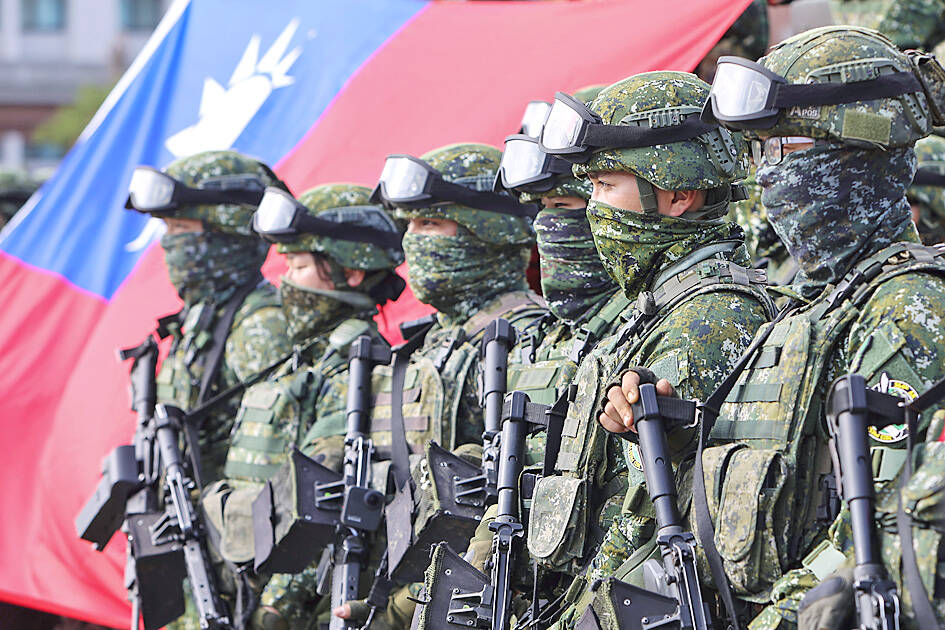Taiwan yesterday told China to stop its “destructive unilateral actions” after more than 100 Chinese warplanes and nine navy ships were detected in areas around the nation.
The Ministry of National Defense (MND) described the number of warplanes detected in 24 hours as a “recent high,” while Beijing has so far refrained from issuing any official comment on the sorties.
“Between the morning of September 17th to 18th, the Ministry of National Defense had detected a total of 103 Chinese aircraft, which was a recent high and has posed severe challenges to the security across the Taiwan Strait and in the region,” it said in a statement.

Photo: Daniel Ceng, AP
Beijing’s “continued military harassment can easily lead to a sharp escalation in tension and worsen regional security,” the ministry said, as it called on China to “immediately stop such destructive unilateral actions.”
Forty of the planes crossed the so-called median line of the Taiwan Strait, and entered Taiwan’s southwest and southeast air defense identification zone (ADIZ), the statement said.
An ADIZ is a self-declared area in which a country claims the right to identify, locate and control approaching foreign aircraft, but is not part of its territorial airspace as defined by international law.
Last week, Taipei also reported an increased number of incursions by Chinese warplanes and ships.
The uptick came as Beijing said its troops were on “high alert” after two ships belonging to the US and Canada sailed through the Taiwan Strait.
The defense ministry said 68 Chinese aircraft and 10 naval vessels were detected around the nation between Wednesday morning and Thursday morning last week.
Analysts said China could be flexing its muscles to counter US influence in the Asia-Pacific region, as it leads multiple rounds of military drills with allies across the region.
“Politically, China aims to counter the military containment of democratic allies led by the United States,” said Su Tzu-yun (蘇紫雲), a research fellow at the government-funded Institute for National Defense and Security Research.
Chieh Chung (揭仲), an associate research fellow at the National Policy Foundation in Taipei, said that July to September is usually the most active time of year for Chinese People’s Liberation Army (PLA) drills, and he suspected that the record 103 warplanes were part of a PLA exercise on the open seas.
Chieh said he did not think the incursions were meant to coincide with the meeting between Chinese Minister of Foreign Affairs Wang Yi (王毅) and US National Security Adviser Jake Sullivan in Malta over the weekend.
If that were the case, it would expose a lack of coordination between China’s foreign affairs and military branches, he said.
Additional reporting by CNA

The Central Election Commission has amended election and recall regulations to require elected office candidates to provide proof that they have no Chinese citizenship, a Cabinet report said. The commission on Oct. 29 last year revised the Measures for the Permission of Family-based Residence, Long-term Residence and Settlement of People from the Mainland Area in the Taiwan Area (大陸地區人民在台灣地區依親居留長期居留或定居許可辦法), the Executive Yuan said in a report it submitted to the legislature for review. The revision requires Chinese citizens applying for permanent residency to submit notarial documents showing that they have lost their Chinese household record and have renounced — or have never

A magnitude 5.6 earthquake struck off the coast of Yilan County at 12:37pm today, with clear shaking felt across much of northern Taiwan. There were no immediate reports of damage. The epicenter of the quake was 16.9km east-southeast of Yilan County Hall offshore at a depth of 66.8km, Central Weather Administration (CWA) data showed. The maximum intensity registered at a 4 in Yilan County’s Nanao Township (南澳) on Taiwan’s seven-tier scale. Other parts of Yilan, as well as certain areas of Hualien County, Taipei, New Taipei City, Taoyuan, Hsinchu County, Taichung and Miaoli County, recorded intensities of 3. Residents of Yilan County and Taipei received

Taiwan has secured another breakthrough in fruit exports, with jujubes, dragon fruit and lychees approved for shipment to the EU, the Ministry of Agriculture said yesterday. The Animal and Plant Health Inspection Agency on Thursday received formal notification of the approval from the EU, the ministry said, adding that the decision was expected to expand Taiwanese fruit producers’ access to high-end European markets. Taiwan exported 126 tonnes of lychees last year, valued at US$1.48 million, with Japan accounting for 102 tonnes. Other export destinations included New Zealand, Hong Kong, the US and Australia, ministry data showed. Jujube exports totaled 103 tonnes, valued at

BIG SPENDERS: Foreign investors bought the most Taiwan equities since 2005, signaling confidence that an AI boom would continue to benefit chipmakers Taiwan Semiconductor Manufacturing Co’s (TSMC, 台積電) market capitalization swelled to US$2 trillion for the first time following a 4.25 percent rally in its American depositary receipts (ADR) overnight, putting the world’s biggest contract chipmaker sixth on the list of the world’s biggest companies by market capitalization, just behind Amazon.com Inc. The site CompaniesMarketcap.com ranked TSMC ahead of Saudi Aramco and Meta Platforms Inc. The Taiwanese company’s ADRs on Tuesday surged to US$385.75 on the New York Stock Exchange, as strong demand for artificial intelligence (AI) applications led to chip supply constraints and boost revenue growth to record-breaking levels. Each TSMC ADR represents